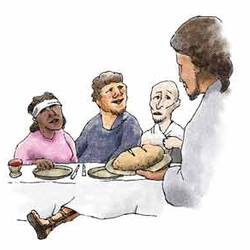Click here if you don’t see subscription options
All good things must come to an end, right?
Not necessarily.
America magazines online "Open House" will conclude on August 31, but you can stay on as a Web-only subscriber for next to nothing.
For just $12, you can continue to access all of the articles published in America, plus great online content like podcasts, video meditations and blogs.
$12! Thats 50 percent off the normal online subscription rate of $24. And 75 percent off our print rate.
As an online subscriber, you can download a PDF-replica of every issue, so you can print it out and read it just like a print subscriber. (Thats 41 issues per year!) Youll also have full access to our online archives, which include seven years of America articles.
Too good to be true? Nope. Just our present to you, as we continue to celebrate the launch of our new Web site.
So please, stay with us. To subscribe, visit your member home page and click on "Subscribe to Americas Web site."
Regards,For the past nine years, James Martin, S.J. has run a popular book club for adult Catholics at the Church of St. Ignatius Loyola, in New York City. As a way of helping readers who might want to begin a similar club in their own parishes, we offer a brief description of a plan that Father Martin has used, as well as the list of books selected for the club
Overall structure of the club
The book club members read a mixture of fiction, spirituality, theology, biography and Scripture. All the books are currently in print and easily obtained either from either Amazon.com or directly from the publisher. The majority (particularly those books published more recently) are also available from major bookstores. All the books are of reasonable lengths (no more than around 200 pages) and if they are any longer (for example, The Seven Storey Mountain) we break them up into two sessions.) Around Christmas, since most people are so busy, I usually assign a Gospel. Not only is it shorter and more easily fit into this hectic time of year, but it is a great devotional tool for the season. Often participants say that it is the first time they have ever read a gospel straight through.
There are two groups: one for adults under 35 and one for those over 35. This helps the participants, especially the younger Catholics, feel that they are meeting and speaking with people with more or less similar life experiences. (Our separate discussions of books like Cardinal Bernardins The Gift of Peace, which focuses on issues of death and dying made this very evident.)
We meet once monthly, on a Wednesday evening in the rectory. We begin at 6:30 p.m. with a simple dinner (usually pizza and sodas). This avoids the problems of "assigning dinners" to a single person, etc., or providing elaborate meals for a large group. Everyone chips in at the end of the night for expenses--no more than a five dollars per person. The casual dinner lasts for roughly an hour, and is an excellent way of helping people get to know one another before the discussion, as well as building community in the parish. Many book club members say that they enjoy this part of the evening as much as the actual book discussion.
At 7:30 we begin with a brief prayer, and then I ask everyone to introduce themselves. This is especially important at the beginning, but even later on everyone appreciates being reminded of peoples names. (We are always open to new members as well; notice of the meeting times and the months book appears in the parish bulletin on a regular basis.)
During their introductions people are also asked to mention something interesting or significant that has happened to them over the past month. This has proven a wonderful way of very gently encouraging some "faith sharing," and is another way of building community. As the members grow more comfortable with one another, what they offer about the past month often grows more personal. Still, this should only be a few minutes per person. If you have, say, 20 people, you dont want to spend 40 minutes on introductions.
The actual book discussion begins at 7:30 and lasts until 8:30. I begin with a simple question, "How did you like the book?" and then try to facilitate a friendly discussion, paying particular attention to any of the more "spiritual" questions that come up. When there is a question of fact, say, about church history or teaching, about Scripture, I try to explain things, and do a bit of catechesis, but otherwise I try to stay in the background. When possible, I have invited any of the authors who are in the area to join us when discussing their book: this is always a great success.
There are only three requirements that I set out: first, to read the book; second, to respect everyones opinions; and, third, not to "hog" any of the discussions. The evenings end at 8:30 with a prayer and a brief description of next months book. Sometimes, I will hand out supplementary material beforehand, for example, if the book is about an historical figure. For the gospels, I always hand out a brief two-page synopsis, taken from any good commentary.
The book club is a great deal of fun, very little work for the organizer (just publicizing it, getting a room, ordering the pizza and selecting the books) but a great way to build community, do a little catechesis, and encourage faith sharing in the parish in a non-threatening way.
Here are the selections for the last five years:
1998









